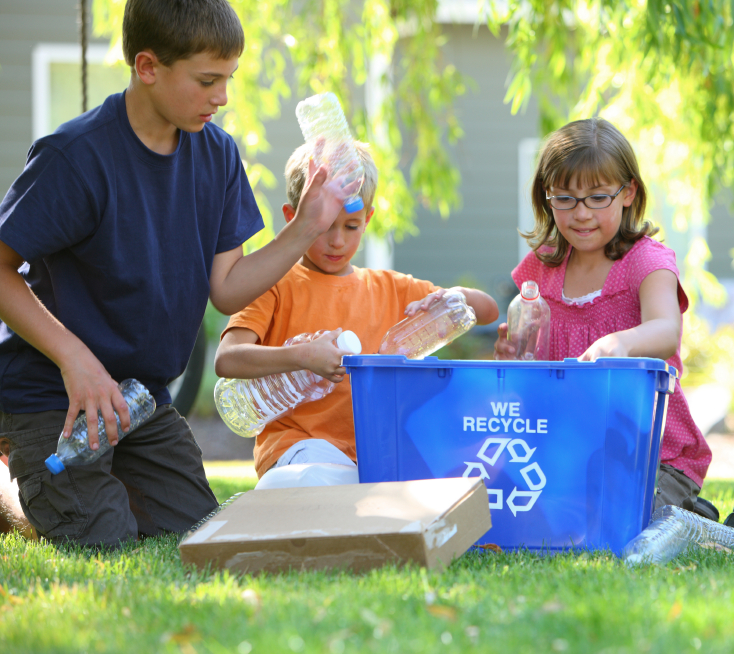It hurts me as an avid recycler to suggest that instead of recycling something you should instead “throw it out”. Unfortunately the recycling industry is going through a tough spot right now since China has stopped taking much of our recycled goods. I wrote about this a few months ago. Frankly most of us don’t “Recycle Right”! We try to recycle things that the local recycling sorting plants don’t accept. When we do that we contaminate the commodity and the recycler then cannot sell the commodity.
Let’s look at plastic for instance. Each recyclable plastic has a symbol on the container with a number 1 to 7 on it. If there is no number “throw it out”. In addition, the local recycling plants do not take Styrofoam or #6 plastics. So, rather than contaminate the whole batch we should “throw it out”. Film plastic, the kind that makes up single use grocery bags and trash bags, are a contaminant at the recycling plant. There is no number on it. Here I would say, don’t throw it out, but take it to the proper place to be recycled. There are bins in the front of most grocery stores, Lowes, Home Depot, Walmart, and Target where you can return these bags. They send it to a completely different facility where that kind of plastic is recycled. If you put your recyclables in a trash bag and throw the whole bag into the recycling bin, you are contaminating that bin!
The recycling industry is working hard to find new customers and new ways to use recycled products. We ruined a good thing by sending way too much trash that was not recyclable to China. They are tired of burying our trash so now require that there be no more than 0.5% contamination in anything they import. Before the ban they were getting up to 20% contaminants in a typical bale of plastic.
Recycling is still the proper thing for us all to do. Sometimes we need to look at alternative ways to recycle. Almost all clothing and fabric can be recycled. Many things that can’t go into the recycling bin can still be recycled. Pick up one of our “Local Recycling Guides” for a list of where many of these alternatives are. Remember if you throw it away, it still has to go someplace. Choose the best place. The Landfill is usually not that place! See our web site if you have questions.
Some rambling observations from a recent trip to Ohio: I grew up and got my education in Ohio but have lived in Texas a long time. Recently my brother in law passed away. He and my sister, Emma, live in a small town in western Ohio. While it is not the same town I grew up in, it is still very similar. Both have populations of about 3000. They are pretty far from any large cities and are surrounded by farm land. This is truly part of the American bread basket. When I lived there nearly sixty years ago, these were small family farms of a hundred or so acres. Most were fenced into parcels of ten or so acres and most had some cattle, sheep, pigs, and chickens as part of their mix of revenue generators. Much of the corn, wheat, oats, and soy beans they grew was used to feed the livestock. Almost everyone had a vegetable garden and some fruit trees.
Today all that has changed. Giant machines now roam the fields and can plant corn in a hundred acre field in a few hours. The farms are now huge and while we were there in early May, most of the fields were just being planted. It was pretty dry, so giant clouds of dust followed behind the giant machines. In some places you could look across the fields now devoid of fence rows and any other green spots and it looked like a desert. We heard that while they planted or just before, the fields were treated with an herbicide like Round Up to kill any potential weeds. With that chemical recently banned by the European Union, it makes us wonder what is really in the food we eat. This area was once part of what was called the Great Black Swamp. This swamp was drained back in the early to mid 1800s. Birds and game were abundant and still were to some degree when I was a boy. Now with the fence rows gone, the forests gone, and almost no native plants left, the lack of wildlife and birds makes the area seem stark.
On a recycling note, the small town where my sister lives does have once-every- two-week recycling pick up in a big 96 gallon roll out bin. That certainly is a good thing as the residents no longer are sending all their valuable resources to the landfill. Perhaps they decided their land was too valuable for planting corn rather than building another landfill. I would certainly like to see all the HOA’s in the Lake Houston area be this progressive.
Way to go Kingwood HS Honor Society! On a recent Saturday morning they picked up trash and recyclable items all over Kingwood. Aimee and her crew of forty or more students did a great job of greening our community with their project, Clean Up Kingwood. Our organization was proud to work with these students. If we all stooped down and picked up one piece of litter a day, Kingwood would be a much cleaner place. You, too, can be an example like these students are!

